

How to End a Relationship. Views: 24037 It’s a skill that’s just as important, but far less studied, than knowing how to start things off.
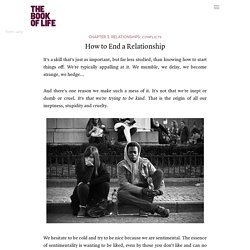
We’re typically appalling at it. We mumble, we delay, we become strange, we hedge… And there’s one reason we make such a mess of it. It’s not that we’re inept or dumb or cruel. We hesitate to be cold and try to be nice because we are sentimental. But kindness has no role whatsoever to play at the charred end of relationships. We need above all to kill hope. The kindest way to end a relationship is to make extremely brutal speeches – of a sort that will leave the other person in no doubt at all that you’re not an especially nice person. There’s no excuse for delay. Jean Vanier - "Seeing God in Others" Frans de Waal sur les notions de coopération et compétition à l'université hommes-entreprises. Université Hommes-Entreprises. Brene Brown: The Power Of Vulnerability. In this special year-end collaboration, TED and The Huffington Post are excited to count down 18 great ideas of 2011, featuring the full TEDTalk with original blog posts that we think will shape 2012.
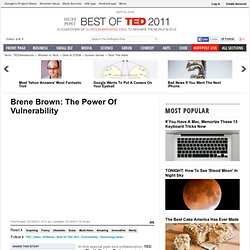
Watch, engage and share these groundbreaking ideas as they are unveiled one-by-one, including never-seen-before TEDTalk premieres. Standby, the countdown is underway! Watch research professor Brené Brown discuss the importance of opening up oneself and feeling vulnerable, then read her follow-up post below. « N’attendez pas pour être un héros ! » – Mark Bezos « SWiTCH.
Jeremy Rifkin on "the empathic civilization"
How feeling socially connected can make strangers' hearts beat together. We find it easier to empathise with people who are socially and emotionally close to us, of course we do.
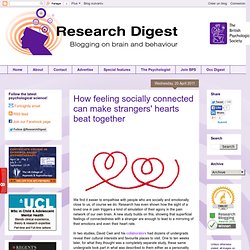
Research has even shown how the sight of a loved one in pain triggers a kind of simulation of their agony in the pain network of our own brain. A new study builds on this, showing that superficial feelings of connectedness with a stranger are enough to lead to a mirroring of their emotions and even their heart rate. In two studies, David Cwir and his collaborators had dozens of undergrads reveal their cultural interests and favourite places to visit. One to ten weeks later, for what they thought was a completely separate study, these same undergrads took part in what was described to them either as a personality and cognition experiment (study one) or an experiment on the physiological effects of exercise (study two). 'The present research suggests that psychologically, the self and the other can blur,' the researchers said.
Cwir, D., Carr, P., Walton, G., and Spencer, S. (2011). Chade-Meng Tan: Everyday compassion at Google. Sam Richards: A radical experiment in empathy. On Optimism and ‘Human Nature’ « Patrick F. Clarkin, Ph.D. In the last few days, I came across a couple of unrelated quotations on human nature and our internal tug-of-war between cooperation and conflict.
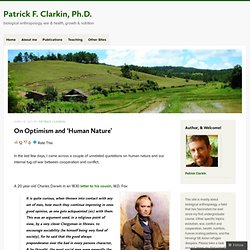
A 20 year-old Charles Darwin in an 1830 letter to his cousin, W.D. Fox: It is quite curious, when thrown into contact with any set of men, how much they continue improving in ones good opinion, as one gets ackquainted (sic) with them. SuperCooperators - By Martin A. Nowak. “SuperCooperators” (written with Roger Highfield, editor of New Scientist magazine) is an absorbing, accessible book about the power of mathematics. Unlike Darwin with his brine bottles and pigeon coops, Nowak aims to tackle the mysteries of nature with paper, pencil and computer.
By looking at phenomena as diverse as H.I.V. infection and English irregular verbs, he has formally defined five distinct mechanisms that have helped give rise to cooperative behavior, from the first molecules that joined to self-replicate, to the first cells that formed multicellular organisms, all the way to human societies, which exhibit a degree of cooperation unmatched in all creation. In Nowak’s view, figuring out how cooperation comes about and breaks down, as well as actively pursuing the “snuggle for existence,” is the key to our survival as a species. Martin Nowak. Martin Andreas Nowak (born 1965) is the Professor of Biology and Mathematics and Director of the Program for Evolutionary Dynamics at Harvard University.
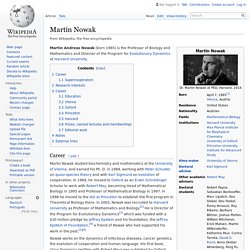
Career[edit] Martin Nowak studied biochemistry and mathematics at the University of Vienna, and earned his Ph. D. in 1989, working with Peter Schuster on quasi-species theory and with Karl Sigmund on evolution of cooperation. In 1989, he moved to Oxford as an Erwin Schrödinger Scholar to work with Robert May, becoming Head of Mathematical Biology in 1995 and Professor of Mathematical Biology in 1997. In 1998 he moved to the IAS at Princeton to establish the first program in Theoretical Biology there.
SuperCooperators: Altruism ... Robert Wright: The evolution of compassion. Krista Tippett: Reconnecting with compassion. L’âge de l’empathie. Frans de Waal1 était spécialiste de l’agression animale quand il a vu mourir son chimpanzé préféré Luit, des suites de luttes de pouvoir.
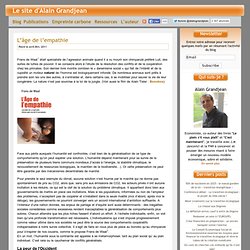
Il se consacra alors à l’étude de la résolution des conflits et de la coopération chez les primates. Son dernier livre montre combien le « darwinisme social » qui fait de l’intérêt et de la cupidité un moteur naturel de l’homme est biologiquement infondé. De nombreux animaux sont prêts à prendre soin les uns des autres, à s’entraider et, dans certains cas, à se mobiliser pour sauver la vie de leur congénère. La nature n’est pas soumise à la loi de la jungle. (Voir aussi le film de Alain Tixier : Bonobos) Face aux périls auxquels l’humanité est confrontée, c’est bien de la généralisation de ce type de comportements qu’on peut espérer une solution.